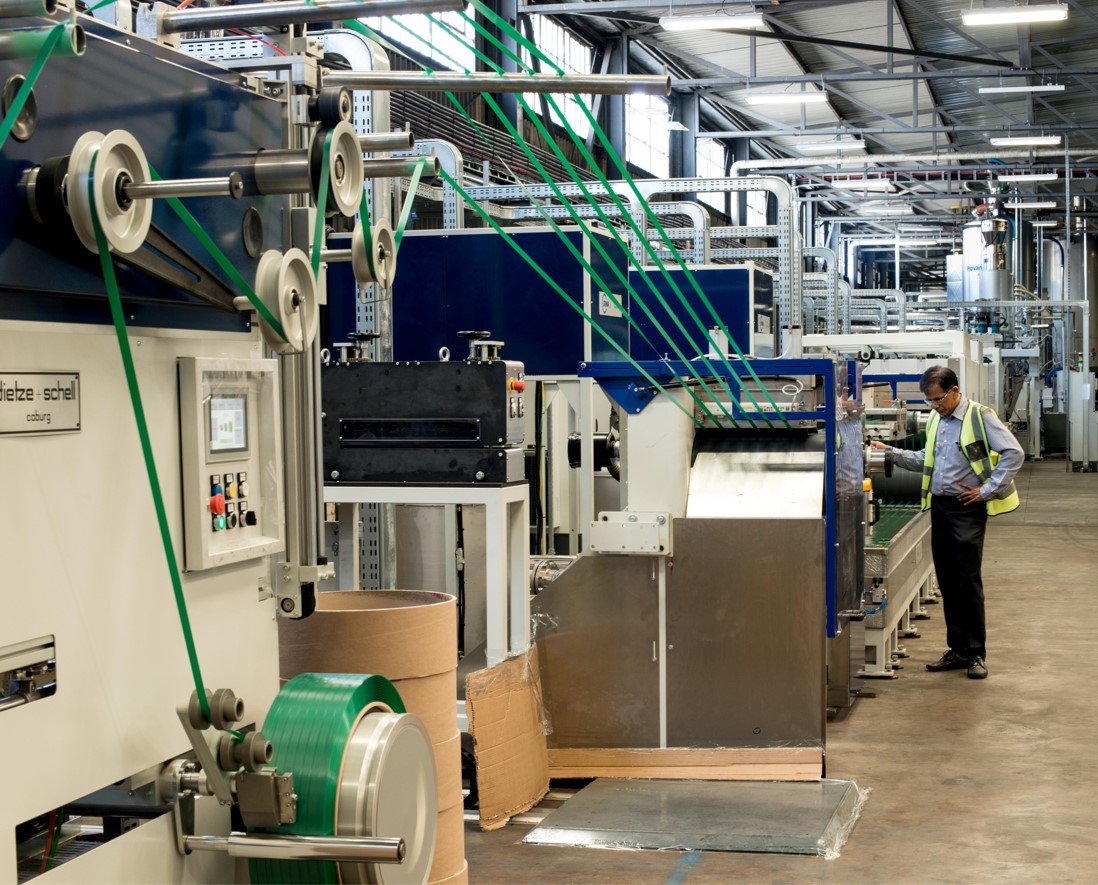
As companies navigate the new mandatory extended producer responsibility (EPR) landscape, a leading recycler in the plastics value chain has revealed the unexpected ease in managing its new reporting and compliance requirements as a producer.
One of the biggest recyclers of PET plastic bottles on the African continent, Extrupet, has been guided in its journey by long-standing producer responsibility organisation PETCO. At the same time – and in a first for South Africa – Extrupet is helping its long-time partner to develop an additional end-use market for recycled PET (rPET) in the manufacture of rPET industrial strapping.
Plastic strapping is used extensively to secure unstable goods during transit. From a circular economy perspective, both PET bottles and PET strapping can be diverted from landfill, and economically recovered and recycled into new products, without compromising the quality of the end product.
As a manufacturer of strapping, Extrupet, like other packaging producers, is now obligated to either join an existing producer responsibility organisation (PRO), start a new PRO or run an individual compliance scheme, as part of the National Environmental Management Waste Act (NEMWA) Section 18 mandatory EPR regulations, which came into effect on November 5 last year.
Extrupet is currently the only strapping producer registered to meet its mandatory EPR obligations with the Department of Forestry, Fisheries and the Environment.
In terms of the regulations, producers must take practical and financial responsibility for the full lifecycle of their products. This means designing packaging with recyclability and circularity in mind and also including more recycled content in their products.
“Many companies are still importing rPET strapping, so closing the loop locally provides another high-value end-use for rPET, aside from bottle-to-bottle recycling, or turning it into polyester staple fibre,” said Extrupet joint managing director Chandru Wadhwani.
While clear PET plastic bottles had the highest commercial value for bottle-to-bottle recycling, Wadhwani explained that green and brown PET bottles had limited end-use products associated with them, because they discoloured the recyclate and could not be used for bottle-to-bottle recycling.
“In the past, plastic strapping has provided a viable end-use market for coloured rPET. As producers begin to move away from coloured to clear bottles for maximum recyclability, the clear bottles can now also serve as feedstock for strapping,” he said.
I would like to encourage companies to support homegrown circular initiatives. The more end-use markets we develop for rPET, the more the benefits will be felt along the entire value chain – right down to the waste pickers.
PETCO CEO Cheri Scholtz said the Section 18 regulations essentially compelled all organisations and companies involved along the plastics value chain to work as a team to ensure that less waste ended up in landfill.
In terms of the regulations, every brand owner, converter, or retailer that places more than 10 tonnes per annum of identified plastic packaging onto the consumer market is deemed a producer and is required to pay an EPR fee per tonne.
“It’s a welcome step forward in creating a circular economy and ensuring a transparent system,” said Scholtz.
The knock-on effect of mandatory EPR is set to be heightened investment in infrastructure to support the sustainability of the recycling sector – from the waste pickers who collect recyclables, to the buy-back centres who purchase and re-sell the materials, and the large-scale recyclers who turn these into recyclate that can be made into new products.
Without EPR, we wouldn’t be able to scale collection and recycling rates sufficiently to make a meaningful difference to the amount of packaging waste that ends up in the environment each year,” she said.
Wadhwani said there was a delicate balance between collection, recycling capacity and demand for rPET in the recycling value chain.
“As the only Section 18-registered strapping producer in South Africa, our strapping helps to maintain that balance by providing another end-use market for rPET. Growth in rPET production and consumption is ultimately key to ensuring the sustainability of both the PET and recycling industry,” he said.
Describing the process of registering as a producer member of an experienced PRO like PETCO as “smooth and easy”, Wadhwani said: “PETCO onboarded us seamlessly, guiding us through the process of setting and measuring targets, and making a potentially complex compliance process seem like plain sailing.”
Scholtz attributed this ease to the knowledge and experience born of 17 years’ operating as a voluntary EPR body.
“We’ve always had audited collection and recycling figures which allowed us to demonstrate a direct link between waste collection and recycling targets,” she explained.
Although PETCO will have to adapt slightly to meet mandatory EPR requirements and support new members in new ways, we do have the advantage of experience over other PROs who may just be getting started.
Strapping falls into the PET flexibles category where legislated targets state that 50% of the product must comprise rPET, 10% must be collected, and 9% recycled. PETCO and Extrupet will be working together to achieve these mandated targets.
“Mandatory EPR has created a space for us to expand our services, starting with a natural extension of the post-consumer PET bottles by including the bottle caps and labels,” Scholtz said. “Extrupet’s inclusion as a strapping producer also broadens PETCO’s portfolio of products for which we offer an EPR scheme.”